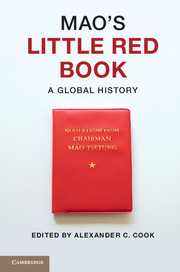Book contents
- Frontmatter
- Contents
- List of illustrations
- List of contributors
- Preface
- 1 Introduction
- 2 A single spark
- 3 Quotation songs
- 4 Mao quotations in factional battles and their afterlives
- 5 Translation and internationalism
- 6 Maoism in Tanzania
- 7 Empty symbol
- 8 The influence of Maoism in Peru
- 9 The book that bombed
- 10 Mao and the Albanians
- 11 Partisan legacies and anti-imperialist ambitions
- 12 Badge books and brand books
- 13 Principally contradiction
- 14 By the book
- 15 Conclusion
- Index
- References
1 - Introduction
The spiritual atom bomb and its global fallout
Published online by Cambridge University Press: 05 June 2014
- Frontmatter
- Contents
- List of illustrations
- List of contributors
- Preface
- 1 Introduction
- 2 A single spark
- 3 Quotation songs
- 4 Mao quotations in factional battles and their afterlives
- 5 Translation and internationalism
- 6 Maoism in Tanzania
- 7 Empty symbol
- 8 The influence of Maoism in Peru
- 9 The book that bombed
- 10 Mao and the Albanians
- 11 Partisan legacies and anti-imperialist ambitions
- 12 Badge books and brand books
- 13 Principally contradiction
- 14 By the book
- 15 Conclusion
- Index
- References
Summary
Once Mao Tse-tung’s thought is grasped by the broad masses, it becomes a source of strength and a spiritual atom bomb of infinite power.
Lin Biao, foreword to the second editionThis introduction is not so much about Mao’s quotations themselves, but rather the effusive foreword that introduced Chinese and foreign readers to Quotations from Chairman Mao at the height of the Chinese Cultural Revolution. Credited to Lin Biao, Mao’s top military man and tireless promoter of the Little Red Book, it described how the written word could transform ideas into a material force for revolution. According to the foreword, the Little Red Book was a weapon of mass instruction – the intercontinental delivery system for a potentially world-shattering ideological payload: “Once Mao Tse-tung’s thought is grasped by the broad masses, it becomes a source of strength and a spiritual atom bomb of infinite power.” Lin Biao’s metaphor was an adulatory exaggeration, of course, but it should not be dismissed as only that. I will show, through an extended exegesis, that the spiritual atom bomb was in fact a coherent concept within its own Maoist intellectual context. More broadly, I will argue that the spiritual atom bomb was also a telling symptom of anxieties about the Cultural Revolution in China, about the Sino-Soviet split within the socialist world, about the larger Cold War between capitalism and socialism, and about the global confrontation with the real prospect of nuclear Armageddon. Lin Biao’s foreword to the Little Red Book arose from historical conditions specific to China in the 1960s, yet it was also a product of the global Atomic Age. In that moment of global existential crisis, when faceless technology threatened to destroy all mankind, the spiritual atom bomb was an alternate vision of the atomic that affirmed the primacy of the spiritual over the material.
- Type
- Chapter
- Information
- Mao's Little Red BookA Global History, pp. 1 - 22Publisher: Cambridge University PressPrint publication year: 2014



